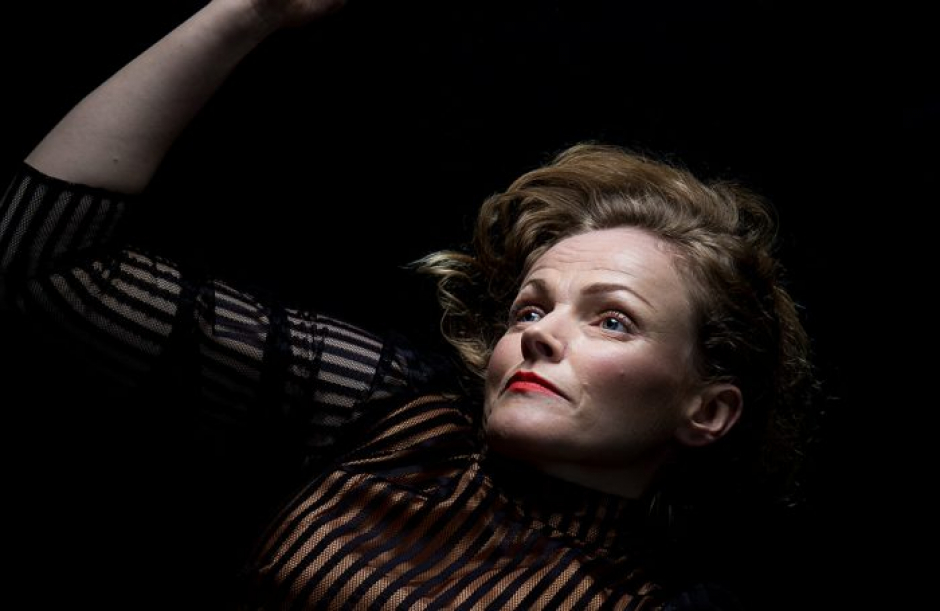Happy Days | Royal Exchange | May 25th – June 23rd
We find ourselves in the Royal Exchange, in the company of Maxine Peake again, having seen her Hamlet, her Miss Julie, her Skriker, her Queens of the Coal Age. For Beckett’s Happy Days, we find her buried, at first, up to her middle, and later, up to her neck, her face vividly brought to startling life by a number of screens suspended over her head. In the programme, Director Sarah Frankom shares the fact that she and Maxine “have wanted to do something funny for quite a long time now.” For those not in the know, Happy Days is Samuel Beckett funny. Samuel “birth astride of a grave, the light gleams an instant, then it’s night once more” Beckett. Samuel “Habit is the ballast that chains the dog to his vomit” Beckett. Samuel “Nothing is funnier than unhappiness” Beckett. You get the drift.
In his biography, Damned to Fame, James Knowlson quoted Samuel Beckett on the subject of Happy Days as saying, “I thought that the most dreadful thing that could happen to anybody, would be not to be allowed to sleep so that just as you’re dropping off there’d be a ‘Dong’ and you’d have to keep awake; you’re sinking into the ground alive and it’s full of ants; and the sun is shining endlessly day and night and there is not a tree … there’s no shade, nothing, and that bell wakes you up all the time and all you’ve got is a little parcel of things to see you through life. And I thought who would cope with that and go down singing, only a woman.” You can see why the part would appeal to Maxine Peake and also why the play would gather resonance, at this particular point in the history of the world.
We meet Peake’s Winnie atop a vast muddy pile, slowly rotating to suit the demands of theatre in the round, her Willie (played by David Crelllin, who we last saw at the Exchange in Saturday Night, Sunday Morning) asleep behind her, at the foot of the mound, by his hole. As with The Skriker, the play is largely a monologue delivered by Winnie, who provides a running self-commentary on her body (“no pain – not much – hardly any”), her day, what she sees, the contents of her bag, what she remembers (“that day – what day”) amidst the vacillations of her memories, indignities and small triumphs wrestling for the uppermost position, Winnie’s fight to remain ‘glass is half full’ epitomised by the line,
“That is what I find so wonderful, that not a day goes by… hardly a day, without some addition to one’s knowledge however trifling, the addition I mean, provided one takes the pains.”
We first saw Happy Days performed by Prunella Scales back in 1993 at the West Yorkshire Playhouse, and Scales’ Winnie was deeply tragic from the outset, an actress at a turning point in her career, playing Winnie as if she was Lear; Peake’s Winnie is very different. She’s funny, to be sure, a dry dame, we sense, a woman who was once something more, fallen on hard times but able to summon a broad Boltonian accent to tell a story of a man and wife who visit her to ask, “What does it all mean?” She harks frequently back to the music hall traditions that Beckett was himself so fond of, bending and turning throughout the first half to share parts of dialogue over her shoulder, as if in asides, to parts of the audience she wouldn’t otherwise be able to face, and there is laughter throughout – far more laughter than I’ve ever heard in the performance of a Beckett play.
But Peake’s Winnie is also Offred, is also Twin Peak’s Laura Palmer. As with the TV adaptation of The Handmaid’s Tale, there are parts of Happy Days that can only be described as harrowing – particularly the shorter second act. And the fear that we see percolating throughout the first act, the speedy delivery, the wobbly bottom lip, the tears that threaten, reach their apotheosis in the marrow-curdling screams which are impossible to separate from the moment in the recent Twin Peaks revival when Laura Palmer screams as if her soul is being torn in two. Frankom and Peake, we sense, feel these resonances and use them. This play may be more then 50 years old but by god it couldn’t be more relevant now. The set makes a subtle apocalyptic statement about the environment, with all manner of plastic crap woven into the fabric of the set. But there is more here than this. If Beckett’s play is about the lot of a woman, then this adaptation cannot but be viewed through the filter of #metoo.
And yet even this is reductive. Peake has spoken of the “joy” there is, between Winnie and Willie, the comfortable pleasures of a long marriage, the easiness that exists between them alongside the irritation. “This play is about the positives that come out of being with somebody that long, and scrutinises that partnership and how it functions.” Frankom too agrees that there is light amidst the shade: “It celebrates the little details of a very long life lived by two people who are symbiotic; they’re their own eco-system.” Perhaps the best way of approaching it, however, if you didn’t know too much in advance, is David Crellin’s own definition: “If the League of Gentleman were doing a one-woman play about marriage, they might come up with something like this.”
At the end, perhaps all you really need to know is that this might well be the best work that Peake and Frankom have done in the Royal Exchange and I for one will be returning to watch it at least one more time.
by Peter Wild

